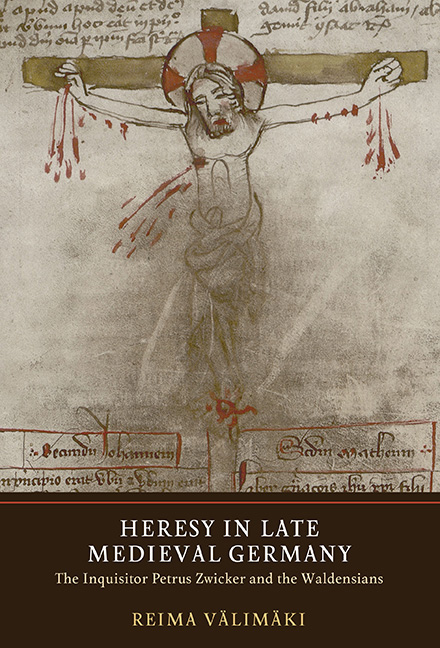Book contents
- Frontmatter
- Dedication
- Contents
- List of Illustrations
- Author's Note
- Acknowledgements
- List of Abbreviations
- Introduction
- 1 Petrus Zwicker and the Career of an Inquisitor at the Turn of the Fifteenth Century
- 2 The Inquisitor Writes
- 3 The Inquisitor's Practice and his Legacy
- 4 Communicating Faith
- 5 The Dissidents, the Clergy and the Church
- Epilogue: The Consolation of Inquisition
- Appendix 1 Manuscript Descriptions
- Appendix 2 Chapters and Titles of the Cum dormirent homines according to Jacob Gretser (1613/77)
- Appendix 3 The Circulation of the Processus Petri together with the Cum dormirent homines
- Appendix 4 Inquisitors' Manuals of St Florian and Linz
- Appendix 5 Collation of Formularies in St Florian, MS XI 234 and Würzburg, UB MS M. ch. f. 51
- Bibliography
- Index
- YORK MEDIEVAL PRESS: PUBLICATIONS
Epilogue: The Consolation of Inquisition
Published online by Cambridge University Press: 26 March 2019
- Frontmatter
- Dedication
- Contents
- List of Illustrations
- Author's Note
- Acknowledgements
- List of Abbreviations
- Introduction
- 1 Petrus Zwicker and the Career of an Inquisitor at the Turn of the Fifteenth Century
- 2 The Inquisitor Writes
- 3 The Inquisitor's Practice and his Legacy
- 4 Communicating Faith
- 5 The Dissidents, the Clergy and the Church
- Epilogue: The Consolation of Inquisition
- Appendix 1 Manuscript Descriptions
- Appendix 2 Chapters and Titles of the Cum dormirent homines according to Jacob Gretser (1613/77)
- Appendix 3 The Circulation of the Processus Petri together with the Cum dormirent homines
- Appendix 4 Inquisitors' Manuals of St Florian and Linz
- Appendix 5 Collation of Formularies in St Florian, MS XI 234 and Würzburg, UB MS M. ch. f. 51
- Bibliography
- Index
- YORK MEDIEVAL PRESS: PUBLICATIONS
Summary
Harsh punishment, deserved by the criminal, afflicts the innocent. Immoral scoundrels now occupy positions of power and unjustly trample the rights of good men.
Boethius, The Consolation of Philosophy, 1.poem 5.
We return finally to Boethius, whose De consolatione Philosophiae was the only work besides the Bible to which Petrus Zwicker referred in all his antiheretical and theological works. I found this detail extremely intriguing when it became clear to me. It seemed that history had a sinister sense of irony. A man who interrogated and convicted probably thousands of heretics, some of them to death, had as his favourite reading a book written by a convict awaiting his execution. Anicius Manlius Severinus Boethius, a Roman senator in sixth-century Italy, then ruled by the Ostrogothic king Theoderic, fell into disfavour and was sentenced to death for treason. He met his end in a prison in Pavia in 524, by blows from a club. While waiting for his sentence he penned a consolatory philosophical and theological essay on human nature, evil and strokes of fate – and how to accept it all and find consolation in greater and eternal truths. His book would retain its popularity in centuries to come, especially in times of crisis.
Thinking of Zwicker and Boethius led me to reconsider the meaning of the repression of heresy to the persecutors: inquisitors, polemicists, bishops, parish clergy, secular rulers and, at times, ordinary laypeople. I have suggested that the refutation of heresy enabled reflection on the Church, the clergy and the Scriptures. All these became controversial matters in the late fourteenth century, suddenly and alarmingly open to debate as the Church entered a long period of internal division in the Great Schism (1378–1417). When reflected in the distorted mirror of Waldensianism, a heresy that had been condemned already in the twelfth century and that had a sinister reputation among both conventional and reformist churchmen, the polemicists were able defame and blacken some of the more radical opinions that were voiced in the debates on the Schism. After all, the most dangerous opponents were not the secretive, dispersed and by the late fourteenth century stagnant Waldensians, but zealots from the ranks of the clergy.
- Type
- Chapter
- Information
- Heresy in Late Medieval GermanyThe Inquisitor Petrus Zwicker and the Waldensians, pp. 257 - 261Publisher: Boydell & BrewerPrint publication year: 2019



